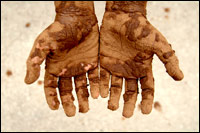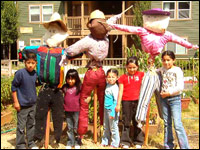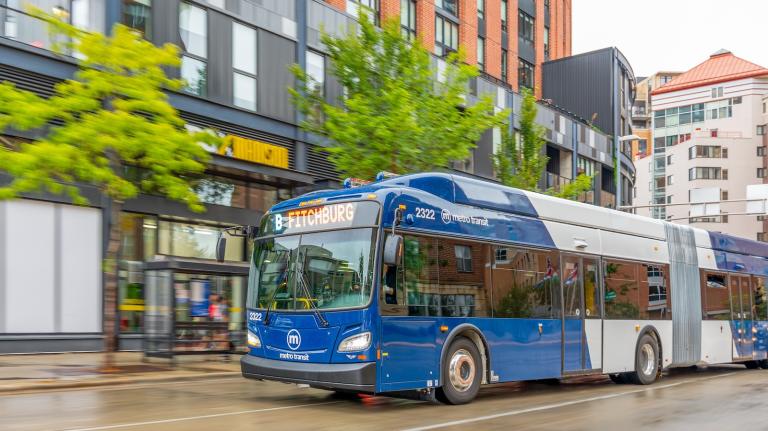What work do you do?
I run a very small, very new nonprofit organization called Verde.
What does your organization do? What, in a perfect world, would constitute “mission accomplished”?

Verde offers a helping hand in the form of green jobs for low-income folks.
Photo: iStockphoto.
The mission of Verde is to increase the economic health of low-income and people-of-color communities by creating environmental job training, employment, and entrepreneurial opportunities, drawing tighter the connections between environmental protection and economic opportunity.
Really it means that we had a perfectly reasonable and very frustrating realization: that low-income folks — people who really, really need good and healthy jobs — weren’t really getting much of sustainable development’s economic benefits. So we thought, “Damn if they’re going to grow this economy without us.”
What are you working on at the moment?

Verde’s first venture is the Verde Native Plant Nursery, a project to deliver environmental job training and entrepreneurial opportunities to residents of affordable housing. The nursery protects and restores aquatic resources and ecosystems by providing ferns, rushes, and sedges for use in wetland restoration, streamside revegetation, and storm-water management projects. We also provide a highly skilled crew to install and maintain these areas.
Nursery employees receive family wages with benefits, work in a healthy and environmentally beneficial field, have year-round and full-time employment, receive job training, and have the chance for revenue sharing. They will also have the chance to become business owners, either through nursery ownership or through Verde support to establish their own landscaping and/or nursery businesses.
What long and winding road led you to your current position?
For as long as I can remember, I held very strong, initially distinct interests in environmental protection and civil rights. I have a serious problem with authority, which was disruptive until I started working on environmental-justice issues.

Hacienda CDC residents proudly display the fruits of their gardening project labors.
Photo: Hacienda CDC.
In 2001, while working at an affordable-housing provider named Hacienda Community Development Corporation, I participated in a fellowship, the Environmental Leadership Program. We had lots of conversations — about diversity, environmental justice, the environmental movement’s homogeneous demographic, etc. — and it made me wonder what would happen if major environmental groups decided to prioritize those environmental policies with the best potential to deliver job and business opportunities to low-income and people-of-color communities.
Where were you born? Where do you live now?
I was born in New Orleans. I live now in Portland, Ore.
Who is your environmental hero?
Dr. King.
Who is your environmental nightmare?
Dick Cheney.
What are your environmental vices?
Bacon, dry cleaning, and nail polish.
What are you reading these days?
Stationed throughout my house, there are plenty of partially read, overly serious, pictureless books. So, of course, I mostly read comic books. I really like Too Much Coffee Man/How To Be Happy.
What’s your favorite meal?
Boiled crawfish and very, very cold beer.
Which stereotype about environmentalists most fits you?
I cope with my own insecurities by trying to (tell other people how to) solve the world’s problems.
What’s your favorite place or ecosystem?
My front yard. It’s got two very tall lilac bushes and a swing set, so there’s lots of stuff for kids (mine, neighbors’) to climb on. And there are apples, cherries, pears, grapes, and blackberries in the backyard.
What’s one thing the environmental movement is doing badly, and how could it be done better?
The environmental movement does a terrible job of addressing the daily concern of many low-income and people-of-color communities: good jobs.
Think about a situation familiar to many Grist readers: a (city, county, state, whatever) council hearing on proposed new, stronger watershed-protection rules. On one side are the environmentalists, and on the other side the property-rights, wise-use types. For an elected official, this is a pretty standard debate.
What if a different group of people walked in — the kind of people who (right now) don’t attend council hearings on watershed protection — and they said something like, “We like these stronger rules because they mean a better income for us and better lives for our families. Watershed-protection rules created this job I have right now — a good job, with a good wage and benefits. I moved out of affordable housing, and one day, I might start my own restoration business.” What would happen then?
Who’s your favorite musical artist?
I listen to a lot of Paul Westerberg — my son, the babymommy/my ex, and I went to see him when he was here in Portland last year. It was Calvin’s first show, and we stood right up front. To this day, Calvin swears that Paul played “Skyway” just for him. I also love Beth Orton, but she broke my heart last year, twice …
What’s your favorite movie?
I don’t get to the movies enough, but I liked Broken Flowers. I also liked Lost in Translation — that Jesus and Mary Chain “Just Like Honey” outro was beautiful and caught me completely off guard. Now that I think about it, the last three movies I saw in the theater were Bill Murray movies.
If you could have every InterActivist reader do one thing, what would it be?
Learn another language.
What are you happy about right now?
My kids are healthy, they’ve got giant hearts, and they both still talk to me. And I’m working on something I really believe in and had a role in dreaming up/creating.
Nursery Time
How can I and others help low-income people of color? — Corey Paradis, Burlington, Vt.
Well, that’s a big question. Not to be too short, but I would ask them, the ones in your area. To me, and in my experience, and what I tell my students, the most important thing is to truly place yourself at the service of these communities. Seek out organizations serving or from these communities, and offer to help them in any way they want. They know their needs, they know their community. Put in the time, listen to and do what they ask you to do, and you’ll build trust and relationships over time, which will only lead to more opportunities to be of service. Listen to Dr. King’s Drum Major Instinct sermon.
How were you able to start up this nursery in your community? How did it grow successful enough to become a means for job training? I am wondering about the basics. — Sara Cohn, Port Washington, N.Y.
Well, I wouldn’t say we’re successful yet. We’ve done all right so far, and we’ve got a decent chance to be successful — which is all you can ask for when you’re working on social justice. (I mean, if justice was easy, there’d be a lot more of it).
Actually, we’re going about it the other way, at least for now — we’re starting with the training, and through successful training we will be able to provide native plant material and services. Revenues from these activities will support our organization, and through that organization we’ll continue to hire and train more folks. We’ve started by providing routine landscape maintenance services to Hacienda CDC‘s affordable housing properties. This provides us with some revenue and gets our folks out there, where they begin acquiring some basic landscape skills through mentoring and on-the-job training. At the same time, we train them in basic horticulture, native plant installation and maintenance, and how to pass the state’s landscape contractor’s exam.
How did we get to here? Verde and the Verde Native Plant Nursery resulted from HCDC’s sustainable-development program, a disciplined effort to identify an environmental business opportunity appropriate for HCDC and its residents. HCDC began this program because the sustainable-development community had not meaningfully engaged disadvantaged communities, and community-based economic development efforts — existing efforts to create jobs and businesses for Portland’s disadvantaged communities — had not seriously engaged sustainable development.
Convening an Environmental Economy Advisory Group, we created a work plan to identify target environmental businesses. This plan would filter several environmental business opportunities through an analysis of market demand, training needs, capital needs, and the resident community’s capacity. Ecotrust generated a cursory list of 20-plus opportunities, and we first eliminated those with a market demand which was ill-defined or poor. Subsequently, we eliminated opportunities requiring skills either not well-represented in the resident population and/or for which we had difficulty locating bilingual training providers. In the end, we decided to establish a combined nursery and restoration company which could provide its own plant material for use in restoration services. In response, Hacienda CDC developed a detailed, peer-based business plan to guide the nursery’s startup and operation. This business plan gave us something tangible to present to funders and partners, was the basis for the funding we’ve raised to date, and guides the nursery’s startup and operation, including Verde’s establishment as a separate and independent nonprofit organization.
Lastly and of course, it’s a lot of hustle and flow, a lot of building partnerships, fund-raising, long days, fast lunches, and liquid breakfasts.
How can other people get involved in the Verde project or support the project in other states? — Gillian Moritz, St. Louis, Mo.
Well, the native plant world, by definition, is local. But, we do think that the nursery concept is replicable. That is, many communities could economically support a nursery to provide the plant material and skilled labor needed for a community’s restoration, revegetation, storm-water management, or other environmental projects. These nurseries could and should be established as a means to generate local jobs and business ownership opportunities for a community’s disadvantaged members. We also believe that our approach — linking environmental protection with economic opportunity for low-income and people-of-color communities — is replicable.
So, my response would be to see what’s going on in your city with regard to sustainable development, and work — with everyone you can — to help identify and realize sustainable development-related employment, training, and entrepreneurial opportunities for your area’s disadvantaged communities.
Is your nonprofit only available in the Portland area? If so, are there any plans to take it into other Northwest metro areas? — Victoria Beach, Lakewood, Wash.
We are Portland-based, but we have conceived the nursery as a model project. By drawing tighter the connections between environmental protection and economic opportunity, we hope to provide a road map for other Pacific Northwest groups working on economic opportunity for disadvantaged communities, and to build relationships between those groups and sustainable development organizations. Thus, in the future, Verde will share its findings with these other Pacific Northwest groups so that they might replicate this model for their constituencies and strengthen the environmental protection and economic opportunity.
Do you ever get discouraged? — Mary Thill, Saranac Lake, N.Y.
Um, yeah, it’s a function of idealism, no? Like, if you believe you can make change, if you believe in that whole live-for-the-moment thing, if you’re making meaning in real time, and if other people are depending on you, then messing up or failing — or fear of those — can hit you pretty hard sometimes. But I think that’s the price you pay for belief; any vision of a better future is going to be unpleasantly slapped around by all of reality’s barriers to that vision’s realization, including barriers that come from your own doubts.
I just remind myself, pretty regularly, that other folks have gone through a lot worse than discouragement doing this kind of work. I ain’t ever been firehosed, or beaten, or had a brick thrown through my window, and that helps me manage the blues.
Would you sacrifice environmental quality for economic justice? — Patrick Aberg, Washington, D.C.
I think that’s a false choice. Rather, I would sacrifice environmental priorities that do not support economic justice in favor of those environmental priorities that do support economic justice. I mean, environmental benefits will happen anyway, assuming environmental policies produce environmental benefits, right? So why not prioritize the ones that provide people like Hacienda CDC residents the chance to change their own lives?
Did you have any assistance in forming your organization? — Bill Hildner, Atoka, Tenn.
We worked with the Community Development Law Center. They provide legal services to nonprofit organizations in Oregon. I’m also a lawyer, and so had some experience or understanding of entity formation, including nonprofit entities. You can email me at and I’ll be happy to share what I know.
Where and how did you get your economic sense? How did you get educated in the area of business management, taxes, etc? — Hal Hardy, Wilmington, Del.
Well, I’d demur there, for sure. I don’t really have much in the way of business training — I mean, I had macro- and microeconomics in undergrad, but didn’t go to class much, and I didn’t take any business law in law school. I just learn what I have to learn.
When I got to Hacienda CDC, they said “start a credit union,” so that’s what we did. I’m an environmental and civil-rights lawyer by training, but had some experience in creating entities — LLCs, trusts, partnerships — so approached the credit union from an entity formation, rather than business, kind of perspective. That is, these are the steps to entity formation; some of them are regulatory, some of them are financial, some of them are business planning, and we just walked down that road.
Then, when that was done, they said “start a business to employ and train our residents.” Given my background, and that this was enviro la-la land Portland, an environmental business made sense, so we just spent a lot of time and worked with a lot of folks examining different business opportunities until we found one that made sense market-wise, capital-wise, training-wise, and community-wise.
Specific to developing and implementing the nursery business plan, we’ve been fortunate to have a lot of good business folk around — nursery folk, environmental lenders, landscape contractors, program managers, etc. — and I just listen to them and do what they tell me. If I have any economic sense or ability, it’s that I’ve had success at bringing people with different expertise together to contribute their skills and knowledge to the project.
Where I live and work there are many obstacles — or just plain non-cooperation — on a municipal and provincial level for environmentalists. Could you share some ways you have worked around legislative obstacles? — Dale Ladouceur, Edmonton, Alberta, Canada
I wouldn’t say we’ve had to deal with much of that. Where we have, any success we’ve had has come from the relationships we have with folks inside the government (the bureaucratic radicals, you know, the stealthy allies). Sometimes, though, we’ve had to cut our losses because the fights were too costly; even if we could win them, our energy was better spent elsewhere. I mean, if there’s one thing we do, it’s build relationships, and those relationships can help you know whether a fight is coming, whether it’s winnable, how to win it, and when to think about plan B.
Do you wear nail polish? — Mary Thill, Saranac Lake, N.Y.
Yes. I’m partial to deep blue/denim-colored nail polish, but you can only see it if I’m barefoot or wearing flip-flops.
Do you really drink beer with food? The two distinct flavors clash, and should be enjoyed separately, at least in my opinion. — Patrick Aberg, Washington, D.C.
I’m sorry, you’re just wrong. It’s a crime against nature to sit down to an hours-long meal of Cajun food without ice-cold beer.


